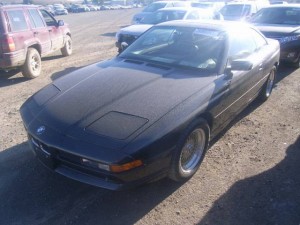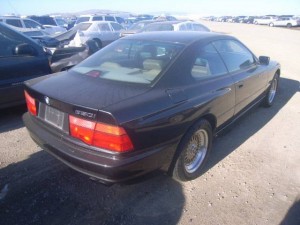By Car Donation Wizard’s own: Sam Andrews
The year was 1991 – George H.W. Bush was president, the first Gulf War was wrapping up, and the world was suffering from a mild economic recession. The Soviet Union finally collapsed. Amy Grant and Pearl Jam were popular on the radio.
1991 also featured the second year of production for the remarkable BMW 8-series, otherwise known by internal chassis code name “E31”.
The 8-series had been in development since the mid-1980s and debuted at the Frankfurt Motor Show in September of 1989. While most people assumed it was a replacement for the aging but adored 1976-1989 6-series, the new 8-series was intended as a whole new class. Indeed, the styling departure and introduction of several new engines emphasized the arrival of a totally new flagship coupe for BMW.
The two most interesting aspects of the vehicle were the styling and available engines.
The body design is credited to German designer Klaus Kapitza. BMW had various lead designers over the years, and several of them responsible for the company’s greatest designs were Italians like Ercole Spada (even Mercedes’ best designs of the 1980s were penned by legendary Italian designer Bruno Sacco), but they turned to a fellow German for the all-new 8. Computer-aided design (CAD) tools, which were advanced for the time, helped create an excellent drag coefficient of 0.29.
The results are stunning. The design is part wedge-shape from the 70s and 80s and part smooth, aerodynamic body style for the 90s and beyond. The hood that tapers to a small, thin nose gave the car the famous nicknames “the great white” and “the shark” for the snout-like look of the front. The slim turn indicator light strips and pop-up headlights were no doubt inspired by the M1 racing car from 1978-1981. Since the M1 was never sold directly to the public, the 8-series is so far the only mass-produced BMW with pop-up headlights.
The angular rear is distinguished by broad red plastic taillights, bold and visible for safety when breaking in front of other motorists. There are also four exhaust pipes.
Engine-wise, the only version initially offered was the 850i with an incredible 12-cylinder engine producing 296 horsepower. Then in 1993 a slightly more fuel-efficient 8-cylinder engine was offered called the 840i, around the same time the company offered V8s on several other models like the 5 and 7-series as well.
The early 90s-era the 8-series was introduced in had a special impact on the car. The Gulf War, global recession, increasing energy costs and general mood of the times made the notion of a lavish, expensive, relatively inefficient vehicle very unattractive for most.The car was also pulled from the U.S. market two years before it ceased production worldwide in 1999. The total number of cars sold in North America was only 7,232 over seven years. This makes the BMW 8-series a rare and desirable car.
Some people swapped the 12-cyl. for a GM engine. The car could be considered a commercial flop, because they were expensive, sold few units, and were costly to repair for owners, but they are a fan favorite and will probably be elevated to classic status in years to come.
Our 1991 car donation example features black paint, tan leather, unique gold BBS cross-spoke wheels, and 178,645 on the odometer.


